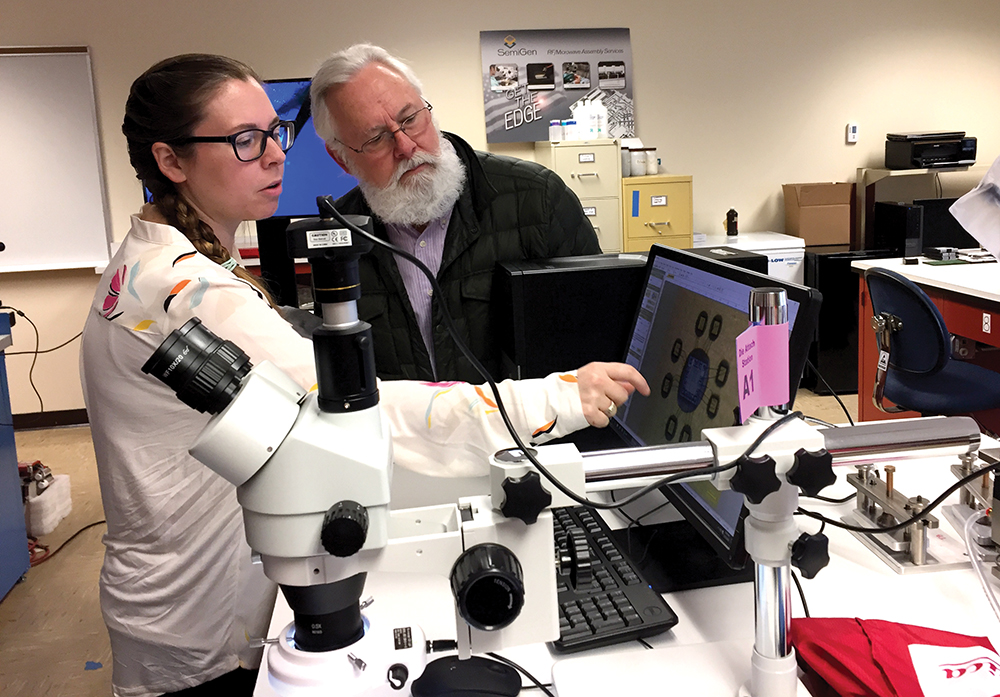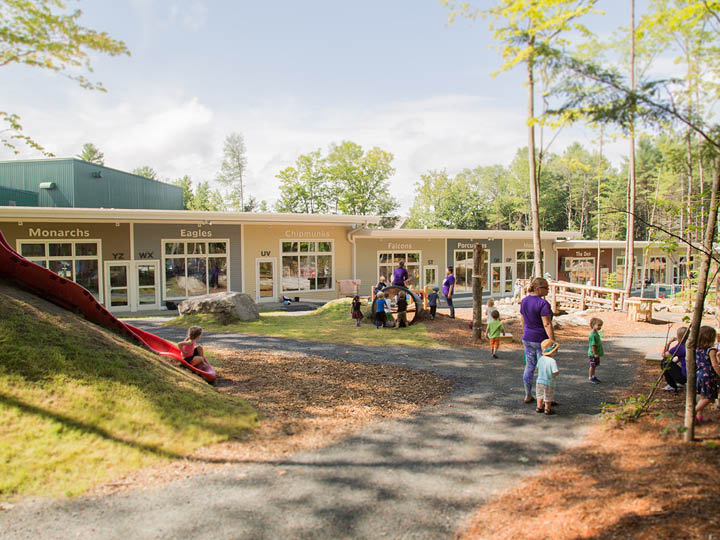
Colleges and universities face stiff competition for students, particularly in NH where there are more aging boomers, and fewer teens in a region with the highest number of colleges per capita nationwide. Against this climate, college officials must redefine higher education and innovate.
New England’s colleges, particularly in NH, are bracing for a new reality. In 1990, 18-year-olds represented a quarter of NH’s population. By 2017, that percentage shrank to about 19%. The state’s population is aging faster than the national average, threatening future college enrollments in a region that draws around 40% of its students from within NH.
In its most recent report, the National Student Clearinghouse Research Center, which tabulates enrollments at private and public two- and four-year institutions, shows a steady eight-year dip in enrollment.
In “Demographics and the Demand for Higher Education,” author Nathan Grawe, a professor of social sciences at Carleton College in Minnesota, projects the number of high school graduates in New England will decline by as much as 15% to 20% over the next 15 years.
Robyn Griswold, vice president of academic affairs at Nashua Community College (NCC), says schools are taking the implications of Grawe’s projections seriously. “It’s causing us to think outside the box,” she says, to reengage adult learners, partner with area businesses to provide the workplace skills they need, offer greater flexibility to students with a mix of on-campus and online courses and balance the needs of traditional and non-traditional students.
One such program launches this fall. Accelerated Lifelong Learning, or ALL, targets full-time working adults who want to earn an associate degree in business management, small business, entrepreneurship or psychology.
Samantha Belcort, NCC’s continuing education coordinator for Career and Technical Education, says ALL is a hybrid online model where students complete two eight-week courses back to back in a 16-week semester. Students come to campus a couple of evenings a week and some Saturdays and meet with an advisor about once a week. Prior to registration, Belcort will assess students’ experience to transfer what they already know to earned academic credits. The goal is to have many of these students earn a two-year degree without accumulating massive debt.
Quicker Degree Paths
Associate degrees and certificates are often overlooked, according to a new report from the Georgetown University Center on Education and the Workforce, even though students earning these credentials are more likely to land jobs related to their course work. About 94% of certificates and 57% of associate degrees are awarded in career-oriented fields.
The study finds the value of those degrees varies dramatically depending on the field. Those with associate degrees in engineering earn between $50,000 and $60,000, double the salaries of those with associate degrees in education.
Employees with certificates in blue-collar fields like construction take home a median salary between $40,000 and $50,000, as much as those with bachelor’s degrees in liberal arts and humanities.
For many students, shorter degree programs are stepping stones to higher levels of education. “The money you can save is just ridiculous,” says Jon Mason, NCC’s corporate community and continuing education coordinator.
The average annual tuition at private four-year institutions is close to $37,000. The price tag jumps to $50,000 when including fees, room and board, according to the College Board. In contrast, one year at a NH community college is $6,450.
Mason says many NCC students receive their associate degree in mechanical design, electronic engineering or software development, and later transfer to another institution such as the University of NH-Manchester, the University of Massachusetts-Lowell or Southern NH University, which launched the College of Engineering, Technology, and Aeronautics in 2017 after the closure of Daniel Webster College in Nashua.
These students’ educational trajectories may not reflect a linear path from high school, but these passages, while less conventional, are often more strategic.
Among those who have taken a nontraditional path is Ross Faska. The 32-year-old NH native worked for QMagic in Nashua for 11 years. He attended college in Colorado but moved back to the Granite State before finishing and landed at QMagic as an engineering tech. He eventually decided he wanted to go back to school to earn a degree in physics, but needed to improve his old GPA before applying to colleges. Faska enrolled in an associate degree program for machine tooling at Nashua Community College in 2015 and went on to earn a diploma in physics from UMass-Lowell.
His salary increased by 50% as a result of earning the degree and he advanced from technician to electrical engineer, testing focal plane arrays for infrared cameras.
College Credits in High School
If college is the jump start for careers, then high school is the ignition switch for college. As such, NH’s community college and university systems offer students several avenues to earn college credit long before they navigate the college application process.
Pinkerton Academy, Derry’s public high school, is piloting UNH First Step, where students can take a computer programming class at Pinkerton and earn UNH credits. Michael Kulik, Pinkerton’s computer science instructor, coordinated the curriculum with Professor Mihaela Sabin at UNH-Manchester. Kulik says students don’t pay any college fees but gain exposure to the rigors of a college class. “That might boost their applications to [any] university,” he adds.
Kulik currently has 12 students who are eligible for the pilot. Students at Pinkerton and other schools are leveraging the Governor’s STEM Scholarship, allowing them dual or concurrent enrollment in up to two STEM courses at the Community College System of NH for free through the Running Start program. Students can participate in this program starting in their sophomore year of high school.
Another pilot program, the NH Career Academy, allows public high school juniors to enroll in community college courses for Fall 2020 and graduate with an associate degree or certificate in the Spring of 2022 in programs ranging from health care and biotechnology to advanced manufacturing and engineering. Students will also be able to interview for jobs with partnering businesses. It is based on a program piloted at Spaulding High School in Rochester, the Advanced Technology & Academic Center (ATAC) at Great Bay Community College and Albany/Safran, an aerospace parts manufacturer.
Students accepted into the program are enrolled through North Country Charter Academy in Littleton, allowing the state to use allocated charter school funding to offer a two-year program at no tuition for students and no additional cost to NH taxpayers. The program is accepting up to 40 students by lottery before April 1.
So far, North Country Charter Academy is the only “custodial” high school participating in the program. “This initial pilot program will help us determine how successful the program will be and what kind of interest it generates with students," says Nate Greene, bureau administrator of the Bureau of Educational Opportunities at the NH Department of Education.
“Our hope is that additional schools will be interested in becoming custodial high schools, but we do not have an anticipated number for the Fall of 2021.”
Customized Training Programs
With unemployment in NH at historical lows, companies are jockeying for talent in a tight labor market. Hiring managers dangle all kinds of perks, from sign-on bonuses and unlimited vacation to robust tuition reimbursement packages and in many instances, customized training programs with area colleges.
BAE Systems, a global defense contractor and Nashua’s largest employer, is a founding partner of Microelectronics Boot Camp at Nashua Community College, investing $200,000 to develop the non-credit program with the goal of recruiting employees who understand basic military standards and assembly techniques for radio frequency and microwave electronic assemblies. The 10-week program costs students $5,500, and anyone completing it is guaranteed an interview at BAE. The hiring rate is 95%.

Nashua Community College's Microelectronics Boot Camp participant, Ashley Collins, moved from Florida to NH to complete the program. Courtesy photo.
The program recently graduated its 15th class, and other companies, including MIT Lincoln Labs and Ultra Herley in Massachusetts are also participating. Ultra Herley is establishing a tuition reimbursement program for students who accept jobs with them.
Other colleges are partnering with area employers eager to plug gaps in workforce skills. In July 2019, Ruger Firearms partnered with River Valley Community College to place eight of their employees in an advanced machine tool course where they learn to operate computerized and manual mills and lathes, read blueprints and improve their math skills.

River Valley Community College's advanced machine tool course. Courtesy photo.
Manufacturing is not the only industry struggling to fill skilled positions. Lisa Bozogan, director of the FitKids Child Care Center, a preschool and daycare at the River Valley Club in Lebanon with 150 children and a dozen classrooms, says, “It’s a full-time job to try to recruit and hire.” Facing a shortage of licensed teachers, FitKids offers scholarships for an accelerated early childhood education certificate run by River Valley Community College.
The college’s early childhood program director, Kerry Belknap Morris, says the college already had an early childhood education certificate program, but at FitKids’ request, it created a format that allows students to finish the course in one semester rather than two. Assistant teachers at FitKids with no early childhood education credits earn $14.75 per hour, which bumps by $1.50 per hour if they participate in the college’s fast-track program.

River Valley Community College's FitKids Child Care Center. Courtesy photo.
Bozogan says the center needs five to seven more teachers, which is why it’s under-enrolled by about 30 children and has 150 families waitlisted for at least a year. The demand for early education teachers in the Upper Valley continues to surge: the Carsey School of Public Policy at UNH estimates the region lacks about 2,000 licensed daycare slots for children.
At Franklin Pierce University in Rindge, students apply classroom learning to on-the-job training through a partnership with C&S Wholesale Grocers, the nation’s largest grocery supply company, headquartered in Keene. The C&S Scholars Program provides internships and a co-op pathway to employment in accounting, marketing, finance and other academic disciplines.
“We’re looking for ways for recruiting students and giving them a good value when they’re here,” says Mary Ann Gaal, assistant dean for the College of Business at Franklin Pierce University.
Such partnerships are leading the way to the future, says Sue Stuebner, president of Colby-Sawyer College in New London, whose enrollment hovers around 850 and touts a close alliance with the state’s largest private employer, Dartmouth-Hitchcock Medical Center in Lebanon. Dartmouth-Hitchcock is investing up to $3,250,000, beginning with an initial installment of $750,000. The agreement provides the college with the faculty and clinical support to implement five new health science programs and almost triple the size of its undergraduate nursing program from 45 to 125 students. The investment is more than philanthropic. For Dartmouth-Hitchcock, it’s an organic approach to fill more than 1,000 job vacancies.

Nursing students at Colby-Sawyer College in New London. Courtesy photo.
Affiliations between colleges and industries is a growing trend, says Anthony Carnevale, director of Georgetown’s Center on Education and the Workforce, despite pushback from some faculty that institutions are giving too much power to the corporate sector. The reality, he emphasizes, is that the only workforce development system in America is tightly tied to Title IV eligible postsecondary institutions. And where prospective students and their families once judged colleges by cool professors, big labs, field houses and climbing walls, they are now looking at what happens to students after they graduate.
At Colby-Sawyer, arts faculty members spent the last 18 months revamping the liberal education requirements. They’re not putting liberal arts on the chopping block, but Stuebner says, “Students are getting pre-professional training in their major that will allow them to get a job once they finish here.”
Beyond several new bachelor’s programs, Colby-Sawyer is developing an associate track in health sciences. It also added a bachelor’s degree completion program in respiratory therapy and plans to increase enrollment in its registered nurse program.
Colleges are increasingly feeling the heat to deliver program-level outcomes that can be tracked, says Carnevale, a movement that is reflected at the federal level in the bi-partisan sponsorship of the College Transparency Act, which if approved, would document graduates’ earnings and their college majors.
Project Atlas
Southern NH University (SNHU) has built a reputation for innovative ways to earn degrees and credentials. Among them is College for America, an online program that allows students to earn certificates or associate and bachelor’s degrees by demonstrating competency in work related projects. It works with employers to offer low-cost degree programs to employees.
Now SNHU is bringing that model to traditional-age college students who also want an on-campus experience. Project Atlas, introduced in 2018, is a pilot program to test the effectiveness of students taking project-based classes online.
Advancement is based on mastering competencies rather than earning grades. The university is also assessing whether such a program allows students to earn their degrees at a lower cost, says executive director Jennifer Share. “We’re still answering some of those questions.”
Share asked local guidance counselors and principals to refer students who welcomed an alternative learning experience.
The first cohort of students receives tuition scholarships, although they pay for room and board. These college coeds work on projects they might have in the workplace, mastering a series of skills before moving on to the next level.
“So instead of sitting in a class on art history,” she explains, “they may curate an online museum exhibit.”
Because the curriculum is competency-based, students have tasks and submit deliverables to reviewers who then evaluate students’ work. Students have either mastered the competency attached to a project or have yet to master it. If it’s the latter, they get written feedback from the reviewer on skills they need to work on. Then they revise and resubmit as many times as necessary.
Share and a learning coach check in with the students daily to ensure they’re understanding the material.
Joshua Kelly of Tyngsboro, Massachusetts, a lanky 20-year-old sophomore, is among the 20 students who chose to participate in the pilot program. He was attracted by the focus on developing competencies with real world applications. He recalls that in high school, “I’d be sitting in a history class, and I would have no idea how this would help me in the future.”
But now when he gets an assignment asking him to respond to disgruntled employees in a memo, he understands the practical application. “So that’s the kind of stuff that keeps me motivated,” he says.
Project Atlas students will finish their general education requirements for an associate degree before matriculating to a bachelor’s degree in business management. Share says some students may progress through competencies faster than others.
“The students will come out with two transcripts. They’ll come out with their competency-based transcript, which at the end of their bachelor’s degree will list out the 120 competencies that they’ve had to master. And then they’ll have what we call a course equivalency transcript, which will map those competencies into more standard course names and titles,” Share says.
Shorter Paths
Some colleges are offering a pathway to graduate in three years or less, which allows a student to enter the workplace sooner and save on tuition costs.
Keene State College began offering a degree-in-three program last year. Spokesperson Kelly Ricaurte says in-state students may shave tuition by $14,800 or $23,500 if they’re out of state. “Coupled with faster entry into the working world or a faster move to and through graduate school, this savings could double or triple,” she says.

A student conducting biology research in a Keene State College lab. Courtesy photo.
However, a degree-in-three program is not for everyone. Students taking five or six classes at once can flounder because of too much stress, especially if they also hold a job.
Ricaurte says college officials safeguard against these hurdles by mapping out a three-year plan for each major and encouraging students to take summer courses online rather than overpacking a single semester.
To date, only 15 students have officially declared a three-year intent. Students likely to succeed, says Ricaurte, are those who select this option early, meet regularly with an adviser and complete their work on time.
Innovate or Die
Approximately one in five small nonprofit private colleges are on shaky financial ground, according to Moody’s Investor Services. An average of five per year closed in the decade leading up to 2014; analysts projected the number would triple in a few years.
Mount Ida College in Newton, Massachusetts shut down abruptly in 2018. Green Mountain College in Poultney, Vermont also ended its history in 2019 after 185 years; and Newbury College in Brookline, Massachusetts, after a long-time budget deficit, discontinued its operations around the same time.
The pace of mergers is also on the uptick. New England College in Henniker absorbed the NH Institute of Art in Manchester last year; Wheelock College in Boston merged with Boston University in 2018. The counterculture Hampshire College in Amherst, Massachusetts announced last January it was seeking a strategic partner to “achieve a thriving and sustainable future.”
“There are going to be fewer students out there,” says Carnevale. “It’s going to be harder to get them.”
Institutions will scramble for students farther west, many of whom come from low income and minority families; this population wants internships, networking connections and the assurance of a well-paying job.
Janet Chen directs the DC-based Business-Higher Education Forum, which works to cultivate partnerships between corporations and universities. She says, “American businesses are really taking the lead in developing their workforce in critical digital and technological competencies.” Is there a risk that corporations will influence the curricula or dismiss the intangible benefits of a liberal arts education? Perhaps. But for many students and their parents, the risk is worth securing well-paying careers. Chen says industry leaders aren’t turning their backs on soft skills, such as writing, communications and analysis. “I don’t think it’s really an either or,” she says. “It’s a combination of all the skills that are important.”

 Current Issue - April 2024
Current Issue - April 2024